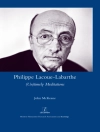Visualizing Loss in Latin America engages with a varied corpus of textual, visual, and cultural material with specific intersections with the natural world, arguing that Latin American literary and cultural production goes beyond ecocriticism as a theoretical framework of analysis. Gisela Heffes poses the following crucial question: How do we construct a conceptual theoretical apparatus to address issues of value, meaning, tradition, perspective, and language, that contributes substantially to environmental thinking, and that is part and parcel of Latin America? The book draws attention to ecological inequality and establishes a biopolitical, ethics-based reading of Latin American art, film, and literature that operates at the intersection of the built environment and urban settings. Heffes suggests that the aesthetic praxis that emerges in/from Latin America is permeated with a rhetoric of waste—a significant trait thatoverwhelmingly defines it.
Innehållsförteckning
1: Introduction.- 2: Destruction: The Garbage Dump as Global Biopolitical Trope.- 3: Sustainability: Waste and its Social, Cultural, and Aesthetic Re-significations.- 4: Preservation: Nature and Urbanism.- 5: Conclusion.
Om författaren
Gisela Heffes is Professor of Latin American Literature and Culture at Rice University, USA, as well as a writer, ecocritic, and public intellectual with a particular focus on literature, media, and the environment in Latin America. Her research interest focuses on topics such as city and rural spatialities, utopias, environmental narratives, displacement and migration. She is co-editor of the Palgrave book series Literatures, Cultures and the Environment.












